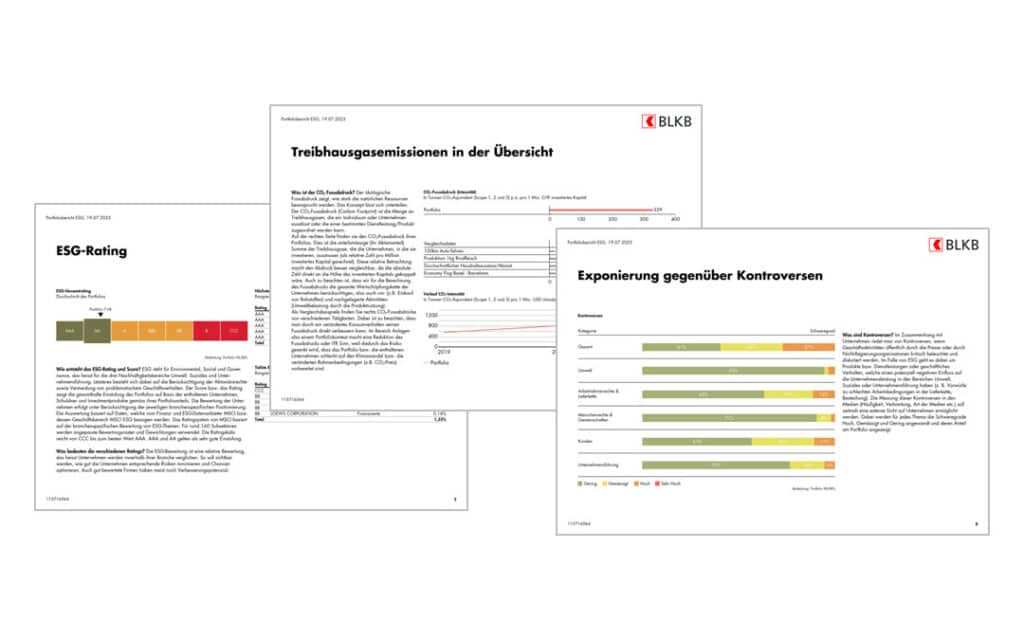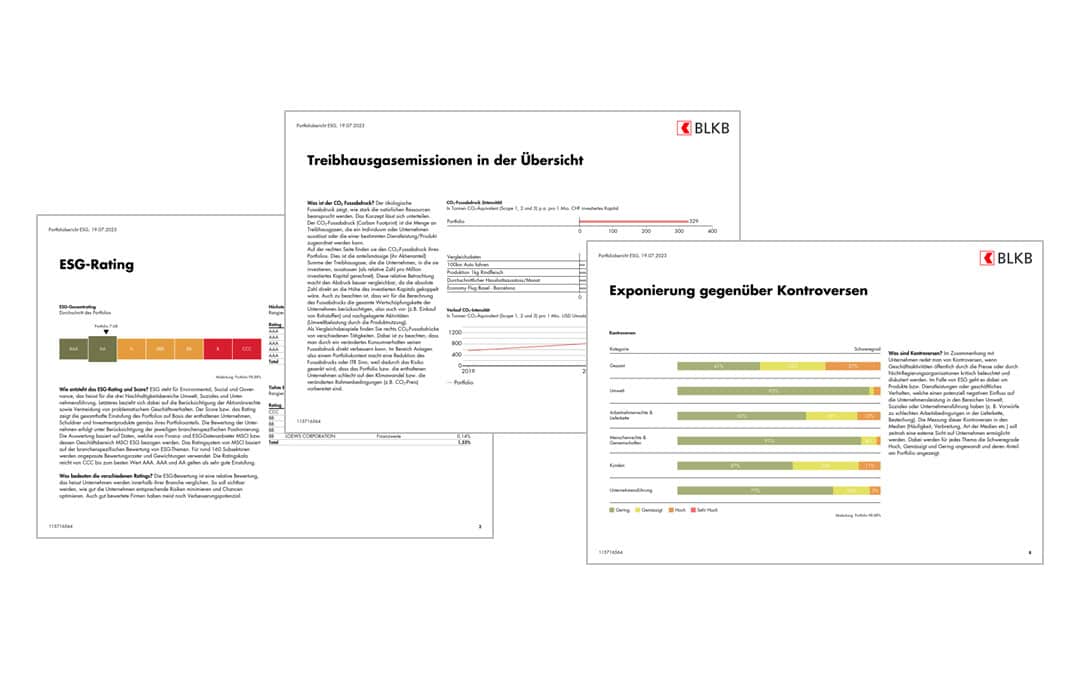BLKB now provides its clients with extended ESG reporting. In this interview, Dominik Pfoster, Sustainable Investment Specialist at BLKB, talks about the reasons for the new ESG reporting, the added value for clients and the challenges of implementation. In doing so, he reveals why BLKB is a pioneer when it comes to transparency requirements.
Basellandschaftliche Kantonalbank (BLKB) already has an ESG reporting system. What prompted BLKB to provide its clients with extended reporting?
Our aim is to offer our clients appropriate ESG reporting. With the simple overview reporting, they receive an initial overview of the sustainability of their portfolio. With the extended ESG reporting, which we are now creating with bmpi, interested clients receive detailed information. A comparison with a benchmark is also provided. It is important for us to offer a suitable transparency about the sustainability of their investments.
What does ESG reporting look like in detail?
ESG reporting currently consists of a standardised template that is the same for all clients. This ensures that both our clients and our client advisors receive the information that is relevant to them and can exchange information about it. We have consciously decided against other reporting formats that present large amounts of data but can ultimately be overwhelming. Instead, we present carefully selected information in an understandable form. In doing so, we try to find the right balance between the scope and quality of the information.
In a first step, the content of the ESG reporting is based on our experience and the feedback of our client advisors. With the current release, we are now approaching selected clients in a pilot project and are eager to hear their feedback.
About Dominik Pfoster
Dominik Pfoster is currently an Investment Specialist and ESG Lead at Basellandschaftliche Kantonalbank, where he works on the further development of sustainability in contact with clients, colleagues and projects.
He already studied climate change for his degree in International Relations in Geneva and holds a Master’s degree in Controlling from the HWZ. At various asset managers, he made sustainable investment a matter of course for institutional and retail investors and helped shape the sustainability transformation of financial companies.
He is also involved in charitable foundations, local politics and culture.
Dominik Pfoster on LinkedIn
And which client group does BLKB serve with the new ESG reporting?
Our expanded ESG reporting is primarily aimed at clients who have an in-depth interest in sustainability information. This includes both private clients who, due to their interest, would like to learn more about the sustainability of their investments, as well as institutional investors. For the latter, comparison with a benchmark is important, showing how their portfolio is positioned compared to a corresponding benchmark index. These investors also have an increased need for sustainability information, whether due to requirements in investment regulations or because their stakeholders want to know more.
In addition, we are addressing another, broader client group by now developing ESG factsheets for our investment funds. These fund factsheets build on the expanded ESG reporting and will be available to all clients who have investment funds with BLKB.
What added value does this give your clients?
With the expanded reporting, our clients receive a more detailed assessment of the sustainability aspects of their investments, such as climate issues and greenhouse gas emissions. In addition, we provide information about our exclusion criteria and how they are complied with. Furthermore, we map sustainability issues that are of interest to certain clients, such as compliance with certain international standards. This information goes beyond standard reporting, but is available to all interested parties.
Another added value is that we provide institutional investors with a benchmark comparison. With this comparison, they can better place their portfolios in the market context. With all this information, including the market comparison, we enable our clients to better assess sustainability risks and opportunities in their portfolios and to objectively discuss options for action.
Pension funds and pension schemes can use this information for their own reporting and communication with their policyholders. In this way, they create transparency and promote sustainable practices.

And what were the challenges in the implementation?
That is a good question. For me personally, the implementation of this project proved to be more complex than originally expected. The technical integration of the various data suppliers such as MSCI was particularly challenging. Here we benefited from bmpi’s expertise, which I consider a key success factor in this project. In addition, we realised that besides the technical integration, the licensing rights are also a complex issue. It is a challenge to ensure that we can obtain and present the data of the invested funds transparently. This is precisely why it is important to us to offer the transparency that is needed in the market and for our clients.
The entire project is an important learning process for our team, as we are required to deal intensively with the handling of ESG data. However, this also improves our understanding of sustainability data.
It is also important to take the right customer perspective, striking a balance between the scope and quality of the information. We want to make sure that the information is both informative and understandable. Therefore, I am looking forward to the results of the pilot project with our clients. The project will provide us with valuable insights and help us to understand their needs even better and adapt our ESG reporting accordingly.
How did the cooperation with bmpi AG come about?
I already know bmpi from the past and regularly receive their newsletter. When the ESG reporting project was due at BLKB, we evaluated various providers. In the process, bmpi came to my mind because of their interesting approach. So we contacted bmpi and included them in the evaluation. In the end, it turned out that bmpi was the best choice for ESG reporting and we decided to work with them.
What form does the cooperation take?
I experience the cooperation with bmpi as very positive. We benefit from the expertise of the staff and appreciate their commitment to our various concerns. It is inspiring to see how the bmpi employees keep coming up with creative ideas. It is particularly important to me that they have a strong drive to continuously develop reporting. This opens up exciting perspectives for the future and enables us to further develop and improve ESG reporting together.
And how do you plan to develop and expand ESG reporting in the future?
The next development step is the integration of client feedback into our ESG reporting. In parallel, we are setting up ESG factsheets for our own funds. These factsheets will probably comprise two pages and the Swiss Climate Scores. The further development steps also depend on the further development of BLKB’s sustainability approach. An already foreseeable topic concerns the presentation of ESG data on proxy voting and engagement, which are not yet covered in the current ESG reporting. In addition, new regulatory requirements will certainly influence ESG reporting. Other future topics in the portfolio are, for example, environmental, social and employee concerns or human rights. In the coming developments, however, we again want to carefully consider what information we can present and what makes sense for our clients.
The technical platform also plays a role in the further development. Currently, we offer the reporting as a PDF. However, we would like to integrate similar reports and presentations interactively in e-banking or directly on the fund website. This will ensure that our clients receive the information where they need it. This was also one of the reasons why we chose bmpi as a partner, as the ESG reporting is already based on a web view.
Finally, I would like to mention that ESG reporting is not a one-off project work that is completed, but rather a continuous process. We are therefore grateful to have found a competent and innovative partner in bmpi to continue on the path of sustainability together.
—
Would you like to learn more about ESG reporting? Click here for more information.
- Would you like to offer ESG reporting to your clients and prospects? Take advantage of our service. Find out more on our ESG website.
- What is the difference between the ESG Web Report and the ESG Print Report? View our ESG Web Report and our ESG Print Report.
- Contact Thomas Tscherrig at thomas.tscherrig@bmpi.ch or +41 44 454 84 84 for a consultation.
Get news on client reporting,
trends, white papers and more.
Subscribe to our blog articles.
